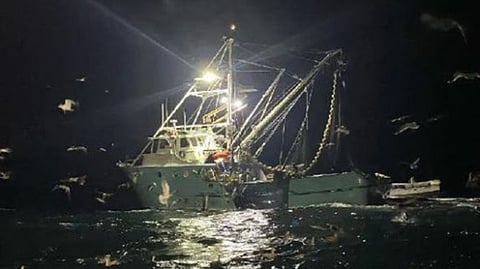California fishing boat captain fined for polluting local waters
A commercial fishing boat captain has been ordered to pay fines for illegally dumping toxic waste into California waters, the Ventura County District Attorney’s Office in California said on Monday, April 21.
William Porter McHenry, the boat captain, owns and operates McHenry Fisheries, which runs the 67-foot (20-metre) commercial fishing vessel Sea Pearl.
According to the district attorney’s office, on December 6, 2024, McHenry allowed waste known as “stick water” to be dumped into the ocean. This waste can pollute the water and harm marine life.
Authorities saw Sea Pearl heading out to sea while releasing stick water, then turning back toward shore without crossing the state waters boundary line.
Stick water is created during the squid fishing process. Squid are caught using seine nets and placed in the vessel’s fish hold, where they are kept in saltwater.
As the squid die, they release ink containing high levels of ammonia, turning the water dark and toxic. This mixture, known as stick water, is classified as a harmful substance.
After the squid are offloaded onshore, the stick water and any leftover wastewater from the offloading process are stored in the vessel’s hull. Proper disposal requires it to be released at least three nautical miles offshore.
An investigation by the California Department of Fish and Wildlife (CDFW) revealed that Sea Pearl offloaded 206,298 pounds (93,575 kg) of market squid in the Ventura Harbor before receiving back the stick water from onshore tanks operated by Silver Bay Seafoods.
CDFW officers observed the vessel heading past the Ventura Harbor break wall, purportedly dumping stick water before turning back toward shore without ever reaching the state waters boundary line.
A CDFW warden boarded Sea Pearl to inspect the vessel’s fish holds and commercial fishing licences. The inspection revealed that three of the four fish holds were completely empty, with only a small amount of stick water remaining in the fourth hold.
When asked to provide the vessel’s most recent navigation track logs, McHenry complied, and the data confirmed that Sea Pearl had never made it beyond the state waters border.
As part of the settlement, McHenry must pay: US$8,444.69 for environmental restoration, with funds going to the Ventura County Fish and Wildlife Fund and CDFW; US$6,555.31 in penalties and investigation costs to the Ventura County District Attorney’s Office; and US$1,889.39 for unfair business practices.


